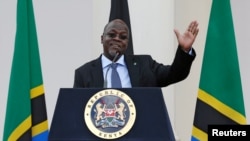Tanzania’s President John Magufuli is known as the “bulldozer” for refusing to tolerate criticism of himself and his policies. Since coming to office in 2015, critics say Magufuli’s government has squeezed press freedoms through harsh media laws and intimidation.
Tanzanian authorities arrested TV journalist Joseph Gandye in August for “publishing false information” after he broadcast a story alleging police abuse of detainees.
Gandye was held for three days, then released on bail.
He stands by his reporting and says the charges are politically motivated.
Gandye says, “When you want to try to report an issue which has the truth and involves authorities, sometimes a journalist, you’ll end up arrested. You’ll end up being told that you have written a false story, even if the story is true.”
Gandye’s arrest came a month after police charged reporter Erick Kabendera with tax evasion, money laundering and organized crime.
Kabendera denies the charges and says they are connected to his critical reports of the Magufuli government.
Rights groups say the arrests are part of a pattern in which Magufuli uses the new media laws in order to silence critics.
Anna Henga is the executive director for Legal and Human Rights Center.
"I would recommend amendment of these laws because even the Universal periodic reviews of the United Nations are recommending that these laws should be amended," said Henga. "They should remove the restrictions, which are put in place by these laws.”
Under Magufuli, Tanzania enacted strict laws on cyber crimes and "media services." The laws allow authorities to suspend media outlets and charge journalists with sedition for publishing information deemed a threat to peace, false, or even just misleading.
Tanzania’s authorities deny cracking down on freedom of the press and argue the laws are needed to prevent media abuse. Harrison Mwakyembe is the minister of information.
He says, “We insist there is press freedom. Myself, I’m a journalist. I am deeply concerned with media houses. I will not allow limiting press freedoms, no. For a journalist, you report your story, criticize the government - but for the purpose of building the country.”
Media groups say the laws are encouraging self-censorship and fueling fears among Tanzania’s journalists that they are a target.
Salome Kitomari is the chairperson for Media Institute of Southern Africa.
She says, ”We have the case that happened two years ago, our colleague Azory Gwanda. Until now we don’t know about his whereabouts. This is something scary in journalism.”
Meanwhile, Tanzania’s journalists do what they can in an increasingly risky profession. For Gandye, that means waiting for his day in court.




